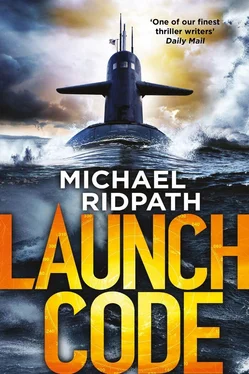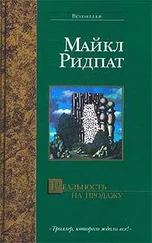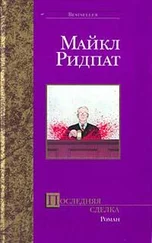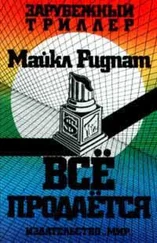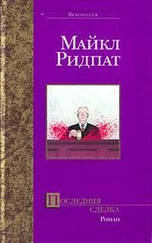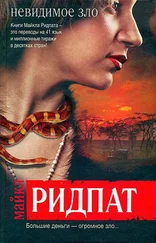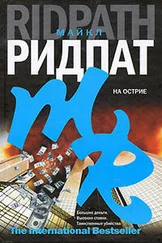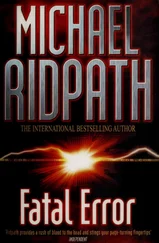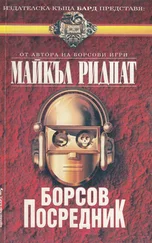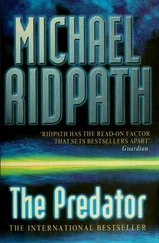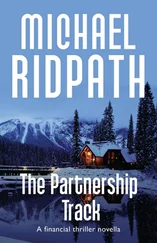The women joined them in the living room. During the interminable commercial breaks, Bill reached for a tapestry and began stitching. It was one he had designed himself, a view of Barnholt from the sea, really just swathes of blue and green and grey and the windmill. Toby had been surprised when he had seen Bill working away with needle and yarn on his first trip up to Norfolk.
Alice had explained that it had started when Bill had finished off some needlepoint that her mother had been working on when she died, with Alice showing him how to do it. He found it had helped, and he worked on another that his wife had already bought. Then he began to design his own — all of Norfolk coastal scenes — which became increasingly less precise and more impressionistic. He never did them in London, only in Norfolk. Toby thought they were rather good.
Justin asked Toby a question.
‘Did Sam say anything about my father this afternoon? Craig Naylor?’
Toby was sure that there was a reason that Justin had asked him and not Bill. But Bill answered.
‘Just briefly,’ he said. ‘I told him what had happened.’
Justin glanced at Toby, who nodded.
‘Did he talk about what my father did when the submarine got the orders to launch? What his reaction was?’ Justin was once again asking Toby. Toby wasn’t clear how much Justin knew about the near-launch, but it was obvious he had known more than Toby. Toby felt a flash of jealousy as he realized Brooke must have told her husband more than Alice had told him. Maybe Brooke trusted Justin more than Alice trusted Toby?
‘No, he didn’t,’ said Toby.
‘Craig was in a different part of the submarine,’ said Bill. ‘He was weapons officer, which meant he was down in the missile control centre. The discussion about the launch orders took place in the control room.’
Justin nodded, and the play started again. The Redskins were third down and five at the eleven-yard line.
The Redskins scored twice, then the Cowboys got a field goal. At half time, Alice announced that she had forgotten some of the food she needed for the following day, and she would pop out to Tesco in Hunstanton to pick it up. Toby offered to come too, as did Brooke, but Alice insisted on going alone, and so he turned his attention back to the half-time analysis.
Alice drove fast to Hunstanton. It wasn’t far, and although it was dark, the roads were empty. The supermarket was just the other side of town and was open twenty-four hours a day.
Alice parked by the entrance and swiftly filled a basket with staples that they might need more of over the next couple of days: milk, bread, coffee, the kind of yoghurt that Maya liked. She swept her purchases through the self-service checkout, and then drove back to Barnholt.
She clenched the steering wheel tightly. She thought she had built a good rapport with Sam. He seemed to like her, indeed he seemed to enjoy the company of all the Guth family. She liked him.
But he was dangerous.
How dangerous, she didn’t yet know.
Once she reached Barnholt, she turned off the main road, but rather than going on along the back lane to the house, she parked by the green, just opposite the King William. The lights were on and there were a number of cars in the parking lot: it wasn’t quite closing time.
Alice took a deep breath, opened the car door, and stepped out into the night.
It was well after eleven by the time Alice got back to Pear Tree Cottage. She noticed that there were still lights on in the living room, and in her father’s study upstairs.
She opened the front door and carried her two shopping bags through to the kitchen.
Toby joined her. ‘The Redskins won,’ he said.
‘I bet Dad was pleased.’
He kissed the back of her neck. She didn’t respond. ‘You took your time,’ he said. ‘That’s not much to show for an hour and a half in the supermarket. I was getting worried.’
‘I had to go to King’s Lynn to get everything I needed,’ said Alice brusquely. ‘Has everyone else gone to bed?’
‘I think so. Shall I give you a hand?’
‘No,’ said Alice sharply. ‘I’ll put it all away; you won’t know where it goes. You go upstairs and I’ll be with you soon.’
But once she had put the groceries away, she crept upstairs to her father’s study. By the time she slipped into bed next to her husband, he was fast asleep.
August 1983, Groton, Connecticut
I loved the Navy. I loved serving in submarines.
I loved the Alexander Hamilton.
She was a Lafayette-class submarine, built in 1962. For three years she had operated out of Holy Loch on the west coast of Scotland. An alternating series of Blue and Gold crews had flown back and forth from the submarine base at Groton in Connecticut to take her out into the depths of the North Atlantic Ocean and wait for the order to blow up the world.
You have to be kind of weird to enjoy working on submarines, especially on ballistic missile submarines which are designed, essentially, to do nothing for long periods of time. For ever, really. Ideally, boomers should never do anything at all.
Patrols last about seventy days. Seventy days of never seeing the sun, never seeing a cloud, never feeling a breath of wind on your face. Seventy days of being crammed in a fat metal tube with a hundred and thirty-nine other men, with no privacy, a bunk that is little more than a coffin, occasional showers that last seconds, food that has been stored for weeks and reheated in minutes. Seventy days where the days of the week and the hours of the day become disjointed and blurred and where the crew toil to keep the sub puttering quietly along at three knots, with its missile hatches firmly shut, slaves to the giant machine.
So why did I love it?
The physics fascinated me, still do. The power of nuclear fission has held me in awe since high school. The idea that all that energy could be contained in a reactor core the size of a small car and manoeuvred around the world’s oceans amazed me. I wanted to be one of the guys taming that power, controlling it, manipulating it, directing it, its master not its slave.
The power of the dozens of nuclear warheads inspired awe in me also, but in an entirely different way. My father had been in the Navy in the Pacific, and had done his bit to make the world safe for democracy. I believed that the Cold War was a real struggle for the future of the world. I couldn’t deny there was a chance that humanity might blow itself up, but I wanted to be one of those people capable of taking the responsibility to ensure nuclear weapons preserved peace, not destroyed everything. My country needed sensible, rational, reliable men to steward its nuclear arsenal, and I was proud to be one of those men.
The Navy encouraged the sense of an elite that went with serving on ballistic submarines, and I responded well to that. They were the great capital ships of the late-twentieth century, and I was glad to serve on them. I was proud of the insignia pinned to my chest: the golden pair of dolphins, the silver submarine with a gold star for each deterrence patrol. As befitted an elite service, discipline was a little more relaxed under the sea than above. And the crew were much smarter.
A submarine was stuffed full of physics and engineering nerds. Sonarmen who could rewire a recording studio, missile techs who were actual rocket scientists, engineers who could design a nuclear reactor. There were probably more men who could solve a differential equation on one submarine than on a fleet of surface ships or, for that matter, in the whole Marine Corps.
That might not have been strictly true, but I believed it was.
The crew of a submarine was a family, who worked together, slept together, kidded together, quarrelled together, and kept the world safe. Together.
Читать дальше
